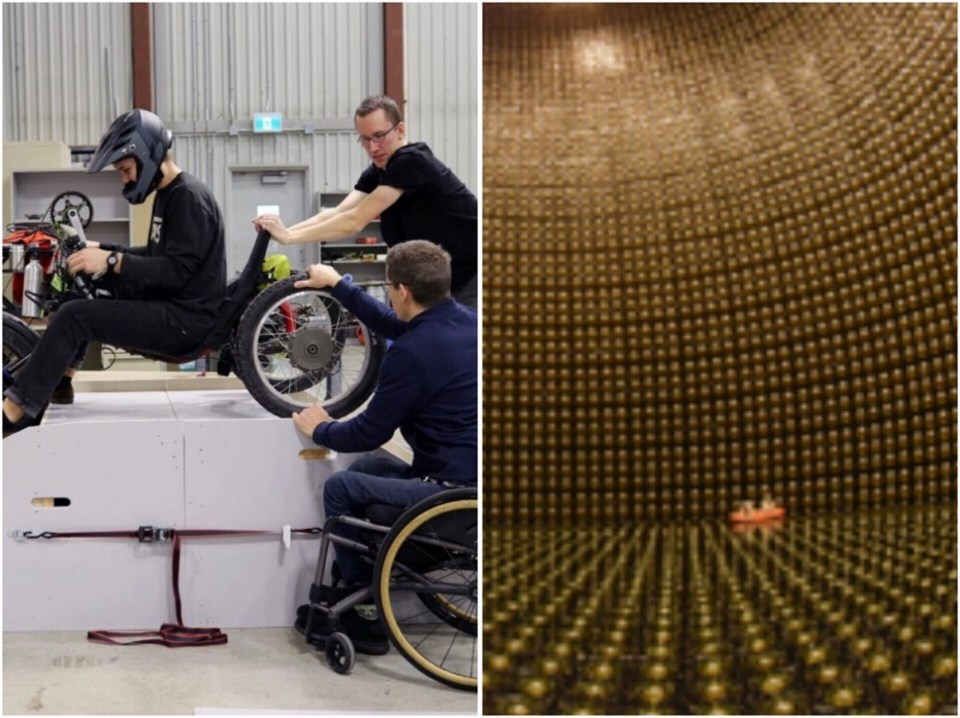Redefining gravity, while understanding why it exists.
The British Columbia Institute of Technology (BCIT) is set to begin a pair of research projects that may have different approaches on paper, but, one could argue, may ultimately go hand-in-hand.
The Burnaby post-secondary recently received more than $7.3 million in combined funding from the Canada Foundation for Innovation (CFI).
The project goals: "building better wheelchairs" and "revealing the secrets of the cosmos."
BCIT is hoping to evaluate the safety, performance and reliability of wheelchairs as they evolve with the latest technology, while also helping international experts to pinpoint the locations of supernovae.
"For over three decades, BCIT researchers and research groups have forged strong partnerships with industry and academia – playing a pivotal role in the creation of innovative technologies, products, and services," said Dr. Kim Dotto, BCIT's dean of applied research and centre for applied research and innovation, in a release sent to the NOW.
"These projects underscore BCIT’s role as a leader in applied research, making real-world impacts and advancing the state of practice."
Spinning wheels
More than $1 million of BCIT's new funding is earmarked , which will be a partnership with and the University of Manitoba.
The purpose of assessing advanced mobility devices is to find new capabilities to conquer "serious drawbacks" and "improve the lives of people with disabilities," BCIT explained.
Led by Dr. Jaimie Borisoff, director of MAKE+, the team is set to develop new hybrid-manual wheelchairs with expanded features that allow users to navigate more difficult places like off-road trails and snowy terrain.
Capabilities explored consist of robotic skills for stair-climbing and power assist units similar to ebikes.
Some of the testing of the models will include an entry into the international Cybathlon Powered Wheelchair Race in Switzerland in late October.
"The work will guide clinicians and consumers in how they select and use these new products, as well as provide evidence to justify their purchase by various funding authorities," the research statement said.
Spinning galaxies
Meanwhile, BCIT students will soon be part of a much larger experiment, to the tune of $600 million, that includes a world-leading research facility in Japan.
CFI granted $6.35 million to Hyper-K Canada, which will allow the Burnaby institution to help study neutrinos from supernovae that'll help pinpoint their location in the galaxy.
The challenge facing the student researchers will be developing more accurate reads.
"The ability to detect and analyze these neutrinos quickly allows astronomers precious time to train their ground and space-based telescopes on the supernova event," the project's profile stated.
"Remarkably, using both computing skills and techniques from nuclear medicine, the BCIT effort managed to decrease the time needed for a vital calculation from minutes to seconds."
BCIT faculty member Dr. Barry Pointon joined the Canadian Hyper-K group in 2019 to assist with Super-K researchers in Japan.
The latest funding will support in the hardware development and deployment at , currently under construction with operations expected to begin in 2027.
"From advances in wheelchair technology, to advancing our understanding of the universe, BCIT researchers are putting Canada at the forefront of global innovation," added BCIT president Dr. Jeff Zabudsky about the two projects.
"Investment from the Canada Foundation for Innovation enables BCIT students, researchers, and faculty to continue to push boundaries and advance applied research in their respective industries. Dr. Jaimie Borisoff, Dr. Barry Pointon, and their colleagues embody the BCIT Vision of empowering people, shaping BC, and inspiring global progress."
BCIT was one of 32 post-secondary schools and research hospitals across Canada to receive the CFI's latest funding.

